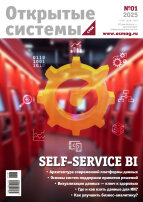
COVER FEATURE
Self-service BI
Self-Service BI: Has the Time Come?
The saying “If you ever need a helping hand, you'll find one at the end of your arm” has become more than relevant for the world of BI tools these days. Why self-service BI is emerging as a steady trend and what could be done to make it a real driving force for corporate culture improvement?
Yuli Goldberg (contact@glowbyteconsulting.com), Division Manager, GlowByte (Moscow).
Self-service BI: From a Niche Tool to End-to-End Solutions
Self-service BI has grown beyond offering business users just basic analytic data processing capabilities. What is the current state of self-service BI tools, and how are they evolving?
Tatyana Khachapuridze (tkhachapuridze@ navicons.com), Delta BI Development Manager, Navicon (Moscow).
Improving Business Intelligence
Present-day companies have a huge amount of data that can be used to improve the quality of BI processes. For data engineers, the objective of extracting data from alternative sources is usually relatively clear and causes no problems. Still, when working within the 1C ecosystem, there are some limitations that can be overcome using special-purpose systems like Extractor 1C.
Denis Smirnov (denis@denvic.ru), CEO, Denvic.
PLATFORMS
Lakehouse: A Cutting-Edge Data Platform Architecture
The explosive growth of business-generated data and the rising number of data consumers necessitate a rethink of analytic platform requirements. Traditional architectures are being replaced by new approaches like the lakehouse, which combines the benefits of data warehouses and data lakes, enabling faster development of analytical scenarios while reducing total cost of ownership.
Vladimir Ozerov (vozerov@querifylabs.com), CEO, Querify Labs (Moscow).
DATA MANAGEMENT
Process-Driven Data Management
While data management practices can add significant value to an organization, their cost-effectiveness should be evaluated before implementation. A process-driven approach offers a viable option, enabling systemic data management without altering existing roles and workflows.
Leonid Shumsky (LSHumskiy@datatech.ru), Data Platform Division Manager, Datatech (Moscow).
Data Visualization: A Key to Health
Data management systems, analytics and visualization have become essential parts of the digital healthcare technology stack. Still, the presence of intermediate links in a data processing chain as well as errors made in medical test result representation may negatively impact analytics efficiency.
Alexander Tyutyunnik (altutunnik@luxms.com), Business Development Director, Luxms Group, (St. Petersburg).
Data Management Infrastructure for AI Systems
These days, AI based solutions draw the attention of many businesses. To train a model in order to achieve sufficient inferencing performance, a certain kind of data infrastructure may be necessary along with relevant tools.
Mikhail Zyrianov (mikez@osp.ru), Editorial Director, OSP.RU (Moscow).
OS MEETING ROOM
Ensuring Data Authenticity
What factors affect data authenticity, and how can data trust be improved? Experts interviewed at the Data Quality 2025 conference explain what tools are necessary to ensure data authenticity.
Mikhail Zyrianov (mikez@osp.ru), Editorial Director, OSP.RU (Moscow).
OS ACADEMY
Generative AI: Efficiency, Expectations, Human Resources
Generative artificial intelligence has the potential to transform business processes in innovative ways. However, simply implementing a generative AI model and creating a chat bot is not enough. Generative AI models bring value only when an integrated approach is taken to their implementation. A project carried out by FINAM has shown this requires extensive business process re-engineering, employee training, and thorough outcome assessment.
Andrey Morozkin (amorozkin@corp.finam.ru), Operation Efficiency Manager, FINAM; Sergey Kobelev (serg@kobelev.ai), Generative AI Strategy Development and Implementation Consultant, (Moscow).
A Set of Services for Efficient Author Data Management
To ensure the accurate import and attribution of publications to their respective authors, as well as to facilitate the transfer of collected data from an automated software system to a digital repository, a suite of specialized services has been developed. This suite not only imports publications from the software system's database into the digital repository but also links them to their authors, conducts duplicate checks, associates authors with previously imported publications, and synchronizes the interaction of all services with organizational information systems.
Andrey Kondratyev (kondratyev@jinr.ru), junior research fellow; Aleksey Bondyakov (aleksey@jinr.ru), senior research fellow, Joint Institute for Nuclear Research (Dubna).
_300x.jpg)
